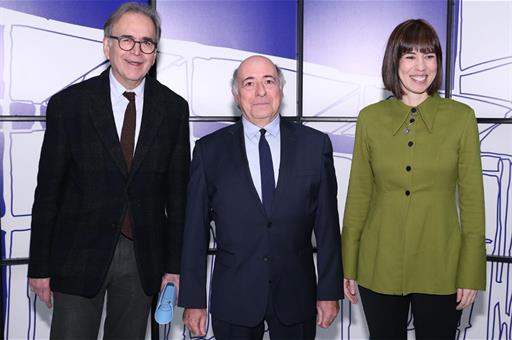The Government of Spain presents the new developments in the scientific and academic career pathway in Spain
News - 2023.1.24
During the ceremony, Morant stated that the new Law on Science, Technology and Innovation and the Organic Law of the University System (LOSU) aim to increase rights for science workers and to build a predictable and stable career to bring our country's researchers out of their eternal adolescence. "These are two regulations that reinforce the role of universities as places of knowledge and collective social progress," she said.
She also highlighted the Government of Spain's commitment to a growing and stable investment in science and the creation of opportunities in this field through the largest public employment offer in the last 15 years. In this sense, she asked for co-responsibility from the regional governments in the financing of universities to reverse the talent drain that we have experienced in the last decade.
Morant also announced that the Ministry of Science and Innovation is going to publish the new call for five-year periods for research personnel from Public Research Organisations (OPIS), which will recognise and remunerate the experience of researchers in Spanish and foreign centres and universities.
Until the new Science Law was passed, experience was only recognised in the main Spanish public research organisations. "In Spain there were not only borders outside the country, but also within our territory between the OPIS themselves and the universities, for example. With these five-year periods, we are putting an end to them," said the minister.
For his part, the Minister for Universities referred to the LOSU, one of the objectives of which, with respect to the competitive examinations for access to teaching posts, is to increase the guarantees of objectivity in the selection committees as an objective with respect to the competitive examinations for access to teaching posts. To this end, the LOSU stipulates that these committees must be made up of a majority of members from outside the host university and chosen by public lottery from among the teaching staff of the same or a higher category as the position in question. Likewise, in order to guarantee the principles of publicity, transparency and competition, the Law stipulates that this call for applications shall be communicated to the Ministry of Universities' public register of teaching and research staff competitions.
In the new royal decree that will regulate the competition system, which is being prepared by the Ministry of Universities, these job vacancies will have to be published in EURAXESS Jobs. This scientific job platform is European in scope, but institutions and companies from third countries also publish job offers.
The aim is to give a boost to the internationalisation of the university system and open it up to the European Higher Education Area. In this sense, in order to facilitate the attraction of international teaching staff, speed up access to the academic career and rejuvenate the staff, the LOSU eliminates accreditation for access to the first stage of the academic career (Assistant Doctor), which is an anomaly in the European university system.
In addition, Subirats stressed that the internationalisation of our country's university system is one of the fundamental axes of the LOSU and, for the first time, there is a specific title dedicated to this subject in the Law.
The event, held at the Universidad Carlos III de Madrid on International Education Day, was also attended by the Secretary General for Research at the Ministry of Science and Innovation, Raquel Yotti; the Secretary General for Universities at the Ministry of Universities, José Manuel Pingarrón; and the Rector of UC3M, Juan Romo.
Euraxess Network
The role of the Euraxess network was also discussed during the event as a means to support research mobility. This European Commission initiative, which the Spanish Foundation for Science and Technology (FECYT) has been coordinating since 2008, has been key to giving visibility to the common principles in the management of human resources in research within the European Research Area.
In addition, the publication of the map "Researcher career path in Spain at a glance" was presented at the event, which explains the main characteristics of the existing positions in the different stages of the research career and promotes European, national, regional and private sector funding opportunities for human resources.
Non official translation





